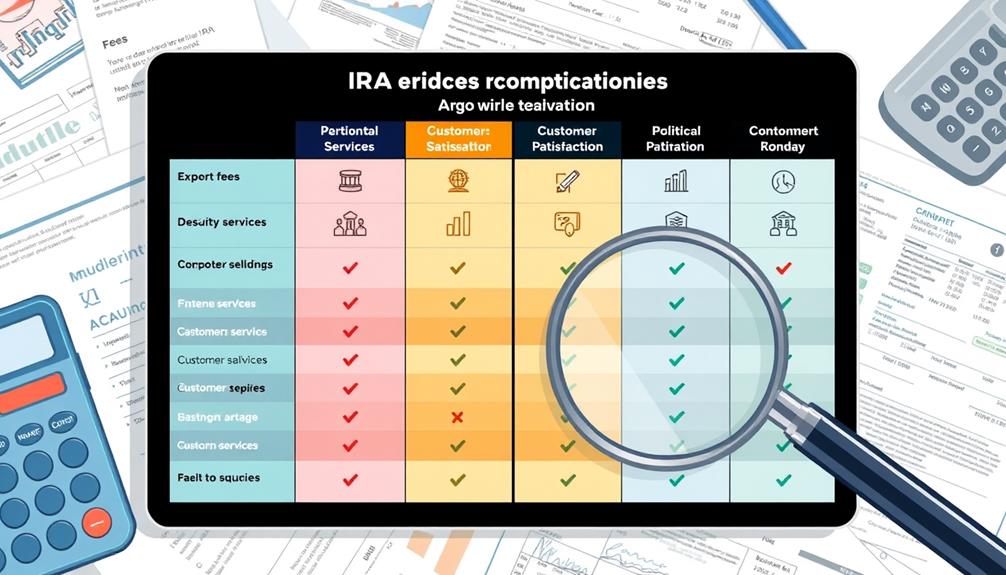When deciding between Fidelity, Vanguard, and Schwab for your IRA, consider your investment style and goals. Fidelity offers flexibility, no minimums, and a wide range of options, making it a great choice for those new to investing. Vanguard stands out with its low-cost index funds, although it has higher minimums, which may suit long-term investors. Schwab boasts a robust trading platform with no minimums, appealing to both beginners and experienced investors. While all three offer commission-free trading, the best option depends on your specific requirements. Take a closer look at each provider to determine which aligns best with your investment strategy and preferences.
Key Takeaways
- Fidelity offers extensive investment options and no minimum investment requirement, making it suitable for diverse investor goals and beginners.
- Vanguard is ideal for long-term investors focused on low-cost index funds, but may require higher minimum investments for some mutual funds.
- Charles Schwab has no minimum investment for most IRA accounts and provides a robust trading platform for both passive and active traders.
- All three providers feature commission-free trading on stocks and ETFs, promoting cost-effective investing for all types of investors.
- Consider your investment strategy: Fidelity excels in flexibility, Vanguard in cost efficiency, and Schwab in a balanced offering of investment products.
Overview of the Providers
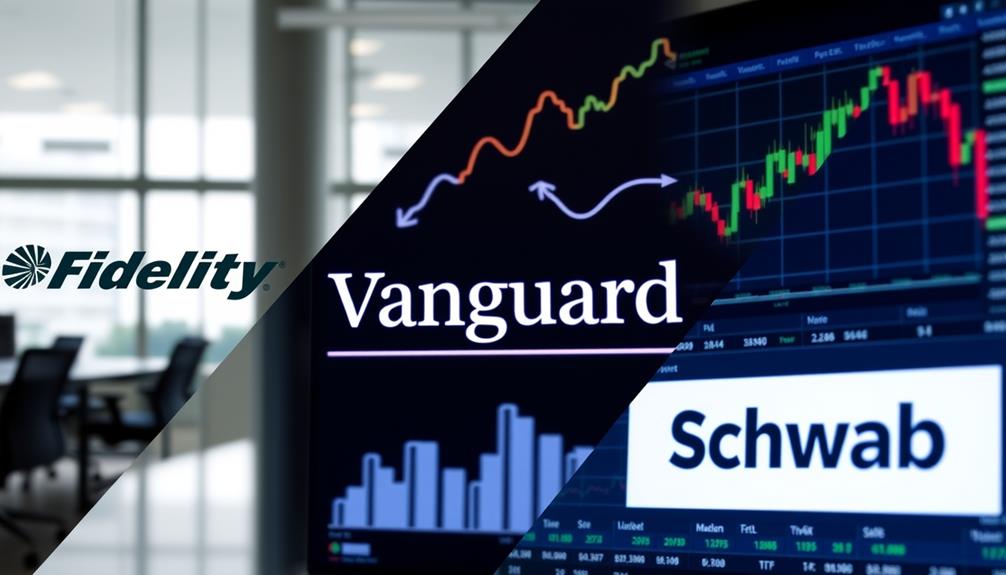
When exploring IRA providers, you'll find that Fidelity, Vanguard, and Charles Schwab each offer distinct advantages tailored to different investing styles.
Fidelity shines with its extensive investment options, including stocks, bonds, mutual funds, and ETFs, plus no minimum investment requirement for IRA accounts. You'll appreciate their zero-expense-ratio index funds, making it easy to keep costs low. Additionally, understanding your investment goals can help you choose the provider that aligns best with your financial strategy.
On the other hand, Vanguard is renowned for its low-cost index funds, though some of their mutual funds do require minimum investments ranging from $1,000 to $3,000. This structure suits long-term, buy-and-hold investors well.
Charles Schwab provides a thorough selection of IRAs with no minimum investment for most accounts, allowing flexibility for various investors. Their robust trading platform caters to both passive and active traders, making it a great choice for those who want to be hands-on.
All three providers excel with commission-free trading on stocks and ETFs within IRA accounts, making them appealing for cost-conscious investors.
Fidelity leads in customer service with 24/7 support, while Schwab is also highly rated for its customer support and educational resources, ensuring you have the guidance you need.
Comparative Fee Structures
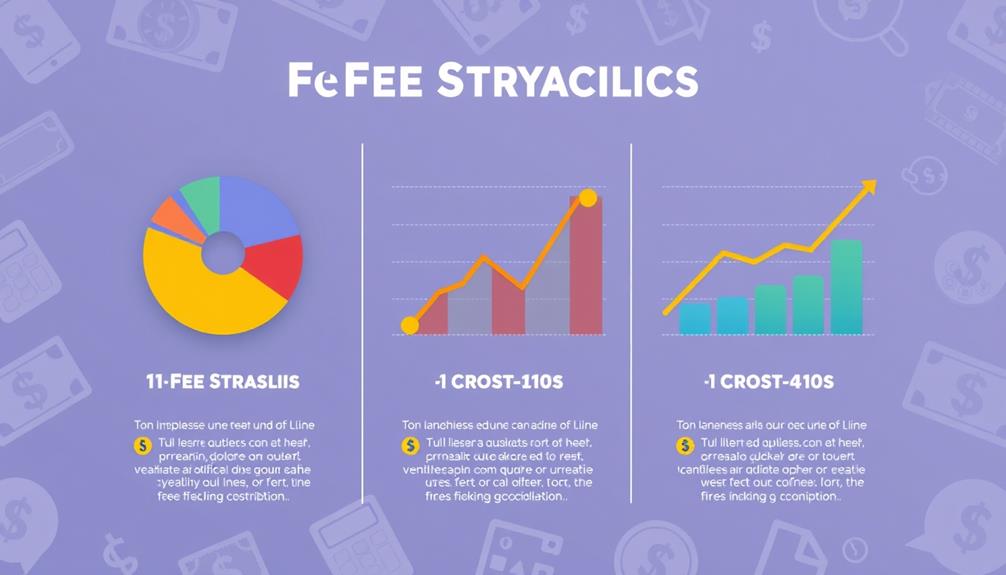
A closer look at the fee structures of Fidelity, Vanguard, and Charles Schwab reveals important differences that can greatly impact your investment returns. All three brokers offer commission-free trading on stocks and ETFs, making them attractive for IRA investments. However, Vanguard's higher fees for mutual fund trades under certain conditions can be a drawback.
In contrast, Fidelity and Schwab provide a more transparent fee structure with no commissions for online equity trades. For those considering diversifying into precious metals, Gold IRAs offer tax advantages that can further enhance your investment strategy.
Fidelity shines with a variety of funds that feature no expense ratios, while Vanguard's index funds typically average around 0.10%. Schwab also offers lower expense ratios than the industry average, which can enhance your returns over time.
If you're into options trading, be mindful that Fidelity and Schwab charge 65 cents per options contract, whereas Vanguard charges $1.00, which could impact your costs if you trade options frequently.
Additionally, Vanguard requires minimum investments for some mutual funds, ranging from $1,000 to $3,000, which may limit accessibility. In contrast, Fidelity has no minimum investment requirement for most accounts, making it a more appealing choice for new IRA investors.
Investment Options Available
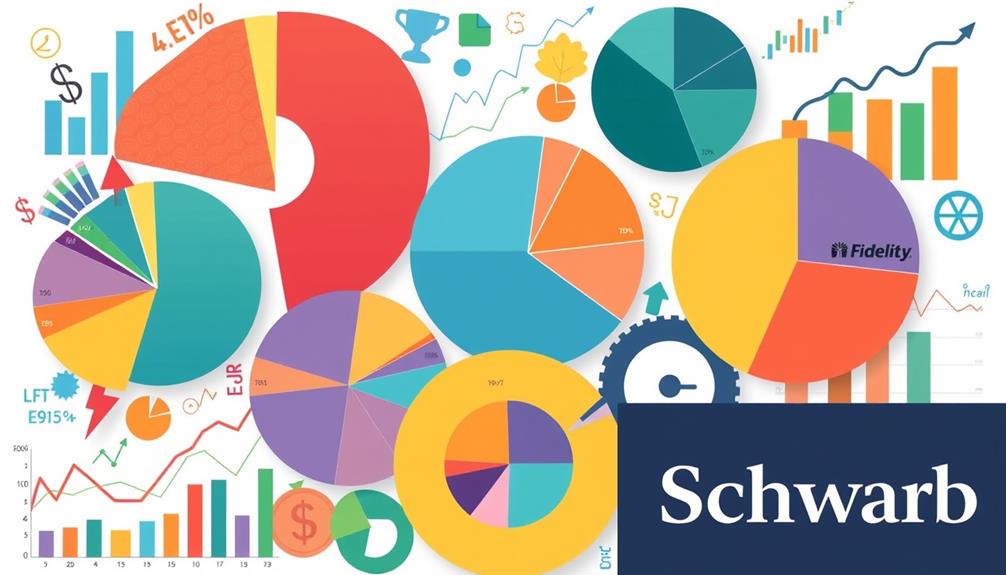
When choosing an IRA provider, you'll want to contemplate the variety of fund types they offer, from index funds to ETFs and options.
Additionally, exploring options like a Gold IRA can enhance your retirement portfolio's diversification, especially in a volatile economy, as it can provide protection against inflation and market downturns diversification of retirement portfolio.
Trading flexibility is also essential, as it can impact how easily you manage your investments.
Plus, the research and tools available can help you make informed decisions about your retirement portfolio.
Fund Types Offered
Investing in an IRA means you'll want to reflect on the variety of fund types offered by different providers. Each firm brings unique strengths to the table.
Vanguard is known for its low-cost index funds and ETFs, though some mutual funds require higher minimum investments, ranging from $1,000 to $3,000.
Fidelity stands out with a wide array of investment options, including stocks, bonds, mutual funds, ETFs, options, and even cryptocurrency trading, and it offers an assortment of no-load, no-transaction-fee mutual funds.
Additionally, incorporating precious metals into your retirement portfolio can enhance long-term financial security, serving as a hedge against inflation and economic uncertainty, which is an important aspect to take into account in your investment strategy.
Gold IRA Rollovers can also diversify your holdings and help mitigate risks.
Charles Schwab provides a thorough selection of ETFs and mutual funds, enhancing its offerings through a partnership with T. Rowe Price for actively managed mutual funds.
Here's a quick rundown of what to take into account:
- Low-cost index funds and ETFs are available across all providers.
- Fractional shares offered by Fidelity and Schwab help diversify your portfolio without considerable capital.
- Investment options at Fidelity are particularly extensive, catering to various strategies.
- Vanguard focuses on low-cost options but may require more upfront investment for some mutual funds.
Choosing the right provider can greatly influence your retirement savings journey.
Trading Flexibility
Trading flexibility is essential for investors looking to adapt their strategies in a dynamic market. When choosing an IRA provider, you'll want to evaluate the range of investment options available to you.
Fidelity stands out by offering a broad selection, including stocks, bonds, options, ETFs, mutual funds, and even cryptocurrency trading, which can provide significant risk management strategies for Bitcoin IRAs. This gives you the ability to diversify your investment strategies effectively.
On the other hand, Vanguard focuses primarily on low-cost index funds and ETFs, which can be appealing if you prefer a long-term buy-and-hold approach. However, their higher minimum investments for some mutual funds, ranging from $1,000 to $3,000, might limit your trading flexibility.
Charles Schwab offers a mix of investment products, including ETFs, mutual funds, futures, and options, while also giving you access to T. Rowe Price's actively managed funds for added diversification.
All three providers allow commission-free trading on stocks and ETFs, which is a big plus.
If you're working with smaller capital, Fidelity and Schwab's fractional shares feature enhances your trading flexibility, enabling you to invest with less.
Vanguard, unfortunately, doesn't offer this option, which may restrict your investment strategies.
Research and Tools
Evaluating your IRA provider also means looking closely at the research tools and investment options they offer. Each of the top three firms—Fidelity, Vanguard, and Schwab—provides unique advantages tailored to different investor needs.
Additionally, it's important to take into account how your overall health and wellness can impact your investment decisions, especially if you engage in cold medications overview for seasonal illnesses.
- Fidelity: Offers a wide array of investment vehicles, including stocks, bonds, options, and a variety of mutual funds, with zero-fee funds available.
- Vanguard: Specializes in low-cost index funds and ETFs, making it a great choice for long-term investors focused on low expense ratios.
- Schwab: Gives you access to an extensive selection of ETFs and mutual funds, including actively managed options through partnerships with T. Rowe Price.
- All three firms: Allow commission-free trading on stocks and ETFs within IRA accounts, promoting cost-effective investment practices.
When evaluating your options, think about your investment strategy. If you're aiming for low-cost, long-term growth, Vanguard's offerings might suit you.
On the other hand, if you prefer a diverse range of investment types or actively managed strategies, Fidelity or Schwab could be the better fit.
Research Tools and Resources
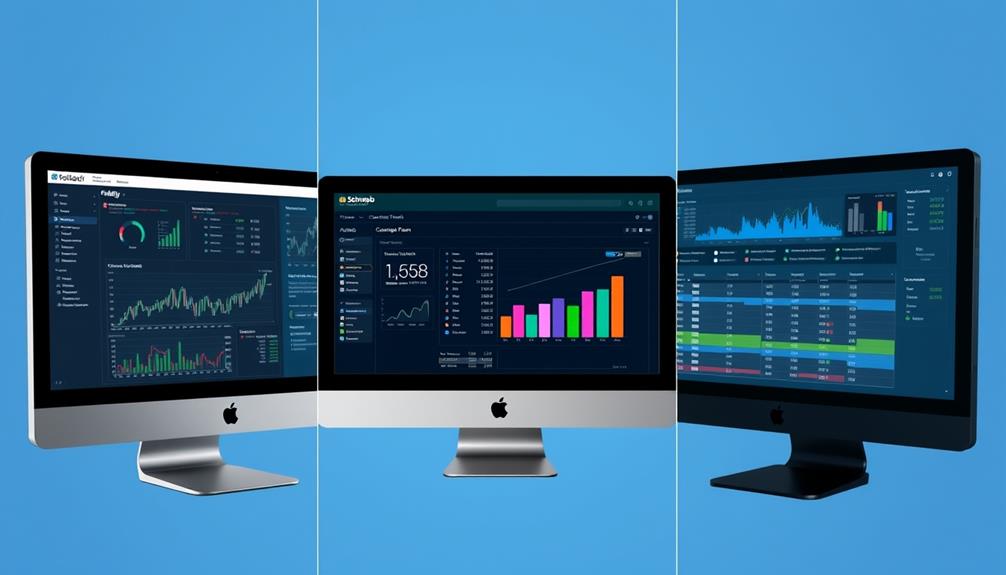
When it comes to choosing an IRA provider, having access to quality research tools and resources can make all the difference. Each provider has its strengths, so understanding what they offer can help you make an informed decision.
| Provider | Key Features | Best For |
|---|---|---|
| Fidelity | Extensive market analysis, advanced charting tools, Learning Center with articles and webinars | Investors seeking thorough research and support |
| Vanguard | Basic research tools, focused on long-term investing, articles, and commentary | Long-term investors prioritizing financial goals |
| Schwab | Extensive educational resources, investment calculators, user-friendly mobile app, Thinkorswim platform for active trading | Active traders and those wanting a user-friendly experience |
Fidelity shines with its robust research platform, including 24/7 customer support and personalized coaching for higher balance accounts. Vanguard, while providing solid investment resources, lacks the advanced features of its competitors. Schwab's Thinkorswim platform stands out for active traders, offering powerful tools and an intuitive trading platform. Ultimately, your choice will depend on your investing style and the level of support you need.
Customer Support and Service

Choosing the right IRA provider involves not only evaluating research tools but also understanding the level of customer support available.
When considering customer service, you'll find distinct strengths among Vanguard, Fidelity, and Charles Schwab. Both Fidelity and Schwab understand the importance of providing resources for investment decisions, including options for gold IRAs, which can be a valuable addition to retirement savings.
- Fidelity offers 24/7 customer service, ensuring you can get help with IRA inquiries anytime via phone or chat.
- Charles Schwab excels in personalized support, providing access to dedicated financial consultants and in-person consultations.
- Vanguard has limited customer service hours but offers extensive online resources and FAQs to assist self-directed investors.
- All three providers feature robust support systems with extensive online resources for interactive guidance.
If you value real-time assistance, Fidelity's round-the-clock support might suit you best.
If you prefer a more tailored experience, Schwab's consultants can guide you through complex decisions.
Vanguard appeals to those comfortable maneuvering their accounts independently but may leave you wanting regarding immediate help.
Ultimately, choosing an IRA provider that aligns with your expectations for customer service is essential for a smooth investing experience.
Target Audience and Suitability

Understanding the target audience and suitability of different IRA providers can greatly impact your investment journey.
If you're a long-term investor focused on low-cost index funds and ETFs, Vanguard could be your best bet. Its minimum investments for some mutual funds range from $1,000 to $3,000, making it ideal for those who can commit to larger initial investments. Additionally, investors considering precious metals may find options like Noble Gold appealing for their specialized Gold IRAs.
On the other hand, if you're seeking a wide range of investment options without minimum investments, Fidelity is the way to go. Its extensive educational resources attract beginner investors who value flexibility in their retirement accounts.
Charles Schwab offers a blend of active and passive investment options, making it suitable for both novice and seasoned investors. You'll find a thorough range of services, including robo-advisory and personalized advice, perfect for different investment strategies.
All three IRA providers support various account types, including IRAs and 401(k) plans, while providing low-cost investment opportunities.
Fidelity stands out for those interested in cryptocurrency trading, whereas Vanguard and Schwab cater to investors with distinct priorities and strategies.
Choose the IRA provider that aligns best with your investment goals.
Online and Mobile Experience

When comparing IRA providers, you'll want to evaluate their mobile app ratings and user interface design.
Fidelity stands out with high ratings and user-friendly features, while Vanguard and Charles Schwab show some room for improvement.
Additionally, just as with AI Ethicist Jobs, a smooth mobile experience can make managing your investments much easier, so it's important to weigh these factors carefully.
Mobile App Ratings
Steering through the mobile app landscape for IRA providers reveals significant differences in user experiences and ratings.
When you're considering which app to use, it's essential to weigh the pros and cons of each provider's mobile app ratings and features. A holistic SEO approach can help you identify which features are most valuable based on user engagement and feedback.
- Fidelity: 4.8 stars on Apple and 4.5 on Google Play, known for user-friendly navigation and advanced trading features.
- Vanguard: 4.7 stars on Apple but only 3.5 on Google Play, suffering from an outdated interface and limited functionality for active trading.
- Charles Schwab: 4.8 stars on Apple, yet a disappointing 2.2 on Google Play due to information overload and complexity.
Fidelity's app shines by supporting various order types and syncing watchlists with the desktop version, enhancing your trading experience.
Vanguard's app, while solid for basic order placement and retirement planning tools, falls short for active traders.
Schwab's app, despite high Apple ratings, struggles with user experience on Google Play, making it less ideal for those seeking a streamlined experience.
Ultimately, your choice should hinge on how you plan to manage your investments and what features matter most to you.
User Interface Design
In today's fast-paced digital world, the user interface design of IRA providers' platforms can greatly impact your investment experience. If you're looking for a user-friendly mobile app, Fidelity stands out with its impressive ratings of 4.8 stars on Apple and 4.5 stars on Google Play. Its app features advanced tools like thematic baskets and customizable dashboards, catering to various investor types. Conversely, Vanguard's mobile app, rated 4.7 stars on Apple but only 3.5 stars on Google Play, struggles with an outdated design and limited trading features. Schwab's app offers extensive functionality but has a low Google Play rating of 2.2 stars, primarily due to user complaints about information overload.
When it comes to desktop platforms, Fidelity excels with advanced trading tools, including Active Trader Pro, perfect for active traders. Vanguard's platform is more suited for buy-and-hold investors, lacking the advanced features of its competitors. Below is a comparison of the three providers:
| Provider | Mobile App Rating | Desktop Platform Features |
|---|---|---|
| Fidelity | 4.8 (Apple), 4.5 (Google Play) | Advanced trading tools, customizable charts |
| Vanguard | 4.7 (Apple), 3.5 (Google Play) | Basic features for long-term investors |
| Schwab | 4.8 (Apple), 2.2 (Google Play) | Extensive but info-heavy tools |
Key Considerations for IRA Selection

Selecting the right IRA provider is essential for maximizing your retirement savings. When choosing between Fidelity, Vanguard, and Schwab, consider the following key factors to guarantee you make an informed decision:
- Investment Options: Fidelity offers a broader range, including stocks, bonds, and no-expense-ratio funds, while Vanguard focuses on low-cost index funds and ETFs.
- Account Minimums: Fidelity has no minimum investment requirement, making it easier for new investors, whereas Vanguard requires up to $3,000 for some mutual funds.
- Fees and Commissions: All three providers offer commission-free trading for stocks and ETFs. However, Fidelity stands out with its variety of no-expense-ratio funds, while Vanguard's average expense ratios hover around 0.10%.
- Customer Support: Fidelity provides 24/7 customer service, which can enhance your experience. In contrast, Vanguard offers limited support hours, primarily online.
Additionally, assess the availability of retirement planning tools and educational resources.
Fidelity's Learning Center features extensive offerings, while all three platforms provide valuable tools to help you navigate your retirement journey.
Frequently Asked Questions
Which Is Better for Retirement, Vanguard or Fidelity?
When deciding between Vanguard and Fidelity for retirement, consider your investment style. If you prefer low-cost index funds, Vanguard's your choice. However, if you want diverse options and tools, Fidelity's likely the better fit for you.
What Is Better, Charles Schwab or Fidelity?
Imagine choosing between two well-stocked bakeries. If you want advanced tools and 24/7 support, Fidelity's your pick. But if you prefer personalized service and a robust trading platform, Schwab's the one for you.
How Do I Choose Between Vanguard and Fidelity?
To choose between Vanguard and Fidelity, consider your investment goals. If you're focused on low-cost index funds, Vanguard's ideal. For a broader range of options and better customer support, Fidelity's your best bet.
Why Choose Vanguard Over Schwab?
If you're focused on low costs and passive investing, Vanguard's reputation and low expense ratios make it an attractive choice. Their extensive index fund options align well with long-term strategies, ensuring your investments grow steadily over time.
Conclusion
In the battle of IRA providers, Fidelity, Vanguard, and Schwab each have their unique strengths, making your choice a matter of personal preference. Whether you crave low fees, diverse investment options, or stellar customer service, there's a perfect fit waiting for you. Immerse yourself in the world of investing and discover which provider can help your retirement dreams soar to astronomical heights. Ultimately, it's about what aligns best with your financial goals and lifestyle. Happy investing!

